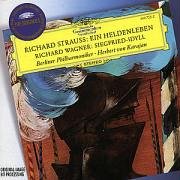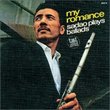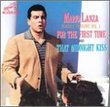| All Artists: Richard [1] Strauss, Richard [Classical] Wagner, Herbert von Karajan, Berlin Philharmonic Orchestra Title: Strauss: Ein Heldenleben; Wagner / Karajan, Berlin Philharmonic Orchestra Members Wishing: 0 Total Copies: 0 Label: Deutsche Grammophon Release Date: 3/11/1997 Genre: Classical Styles: Forms & Genres, Symphonies, Theatrical, Incidental & Program Music, Historical Periods, Modern, 20th, & 21st Century Number of Discs: 1 SwapaCD Credits: 1 UPC: 028944972528 |
Search - Richard [1] Strauss, Richard [Classical] Wagner, Herbert von Karajan :: Strauss: Ein Heldenleben; Wagner / Karajan, Berlin Philharmonic Orchestra
 | Richard [1] Strauss, Richard [Classical] Wagner, Herbert von Karajan Strauss: Ein Heldenleben; Wagner / Karajan, Berlin Philharmonic Orchestra Genre: Classical
|
Larger Image |
CD DetailsSimilar CDs
|
CD ReviewsAn indispensable disc for admirers of Karajan's Strauss JPH | Crawley | 08/25/2003 (5 out of 5 stars) "With due respect to the criticisms that the quality of this 1959 performance is somewhat diminished because the Berlin Philharmonic lacked the opulent sonority they later developed under Karajan, I for one, think the sound of the Berliners as captured here is superb and a complement to their last, and also superb, digital recording with Karajan. The BPO's virtuosity and passion were as present in 1959 as they are 30 years later. It just happens that the sound textures of their strings metamorphosed through continued collaboration with Karajan. If you admire Karajan's latter disc, this 1959 performance is a must-have in your Richard Strauss collection. Appreciated together, they document the beginning and end of a great orchestra's association with a great conductor." A Taste Of What Was In Store For Karajan And The BPO John Kwok | New York, NY USA | 12/28/2002 (4 out of 5 stars) "Admittedly this is far from Karajan's best recording of a Strauss tone poem, yet this 1959 account of "Ein Heldenleben" is spellbinding in its own right with a fine violin solo from the Berlin Philharmonic Orchestra's concertmaster, Michel Schwalbe. I agree with a previous reviewer who noted how the orchestra plays without the cohesion and opulence of sound one hears in the great 1960's and 1970's Deutsche Grammophon recordings. I suppose this merits inclusion as part of Deutsche Grammophon's The Originals series since this was Karajan's very first recording for the label. It is coupled with a splendid performance of Wagner's "Siegfried Idyll" from the 1970's. Fans of both Karajan and the Berlin Philharmonic will not be disappointed with this CD." Incredible! Sungu Okan | Istanbul, Istanbul Turkey | 10/11/2003 (5 out of 5 stars) "This symphonic poem is perhaps, one of the best compositions of R. Strauss. Written for large orchestra (ex. quadruple woodwinds, 8 horns, 5 trumpets, 3 trombones, 2 tubas, harps, timpani, several drums, cymbals, a large string ensemble)This is an autobiographical work. The Hero is the composer, you know. Enemies of Hero are critics (of course), and in 4th movement, there is a battle of they. Especially, this movement is very impressive and Karajan and his Berlin PO are excellent in this work. And, in 5th movement Strauss used themes from his some famous early works, including: Don Juan, Till Eulenspiegel, Also sprach Zarathustra, Don Quixote etc...The performance of Wagner is also very good. Highly recommended, especially for Richard Strauss fans..."
|

 Track Listings (7) - Disc #1
Track Listings (7) - Disc #1


